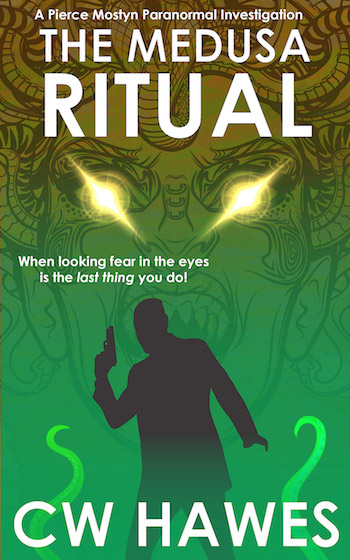Pierce Mostyn, that intrepid foe of the things that go bump in the night, last appeared in Van Dyne’s Vampires, published October of last year.
Next week he will appear in a new adventure, his fifth: The Medusa Ritual.
The germ of the idea for Mostyn’s latest adventure can be found in the Hazel Heald and Lovecraft collaboration “The Man of Stone”. Collaboration, though, is a generous term; for, according to ST Joshi, Heald seems to have contributed virtually no prose to the story — based on textual evidence.
Thus, Heald probably only provided a story idea for Lovecraft to run with. Which he did, and that story then provided me with the idea for The Medusa Ritual. So thank you Hazel for that original idea!
However, while “The Man of Stone” got the wheels turning for The Medusa Ritual, there is nothing of the earlier story in the later one other than people being turned to stone.
While Van Dyne’s Vampires focused on what is essentially a mad scientist and his monsters, in Mostyn’s new adventure we return to the world of cosmic horror. That world where the terror originates from the realization that in the big picture we are completely and totally insignificant. A realization that can easily drive us to despair, madness, or self-destruction.
Nietzsche’s answer to achieving this awareness and its accompanying despair, was for the person to become a creative individual. To become as a god, in other words, for gods create; and in creating, the individual can thereby bring meaning to his or her otherwise meaningless life.
Nietzsche’s answer was essentially an existential one. We are in command of our fate. Counter the meaninglessness of existence by creating your own meaning.
Lovecraft, on the other hand, retreated into antiquarianism, and racial and cultural identity. The old days are good. The old ways are known and comfortable. My own kind are known to me. The foreigner is unknown, a mystery, and therefore suspect.
In Lovecraft’s fiction we see his philosophy play out in his vision of our world having been invaded by alien monster beings who have no regard for us. In strange, swarthy, and dark foreigners who do the bidding of these monsters. And in the insignificance of us Westerners and our science in the face of these ancient beings and their magical rituals. HPL’s conclusion is that it’s best if we don’t know too much of what is really out there, or know any of it at all.
When I come away from reading Lovecraft, I have the feeling that ignorance is bliss. In being ignorant, I can live my life in the delusion that this is a world of meaning and purpose. That I have essential meaning and purpose.
In “The Shadow over Innsmouth”, the narrator comes face to face with the horror of the curtain being pulled aside to reveal what truly is. He has looked into the abyss. In the end, when he realizes that he too will eventually join those monstrous denizens of the deep, rather than end his life, he resigns himself to his fate. For Lovecraft, once we know the truth, we either surrender to it, or go mad, or destroy ourselves. There is no Nietzschian optimism in Lovecraft.
Pierce Mostyn, knowing the truth, doesn’t go mad or destroy himself, but he is weighed down by the understanding that in the end all of his actions are futile. He resorts to duty to keep on going. Much like the ancient Roman Stoics. Duty gives him purpose and meaning in what is an otherwise meaningless and chaotic universe.
Now all of the above is a heck of a lot of philosophy. But don’t worry. It’s all in the background. The Medusa Ritual is not a philosophical treatise. It’s a tale of cosmic horror with plenty of action, adventure, monsters, and daring do. Just what we want to read. Right?
And it will be available, Amazon willing, on July 29th for your reading pleasure.
Comments are always welcome; and, until next time, happy reading!
Share This!